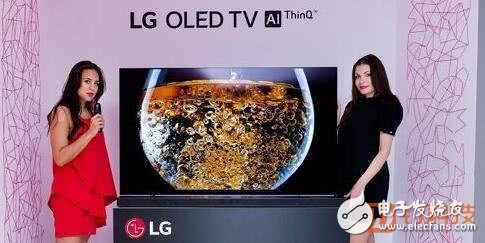As the world's largest color TV brand, Samsung has the same dominance in the TV market as it does in the mobile phone market. Of course, the challenger is not without. In addition to the Chinese brand, the biggest competitor is LG from South Korea. LG's industrial layout is similar to Samsung's, and it has formed a positive competitive relationship with Samsung in the fields of panel, mobile phone and TV. But apart from the panel field, the gap between LG and Samsung is still very obvious. Mobile phone business LG is on the verge of delisting in the Chinese market, the global market is also difficult to trace in the rankings of major institutions, and Samsung is firmly in the top spot in the world; TV business LG is relatively better, but still difficult to rival Samsung, the global leader Long-term second place. But obviously, LG is not willing to be suppressed by Samsung, trying to achieve the surpassing of Samsung in the new display technology iterator, OLED is the breakthrough of LG. At the moment, LG is full of confidence in OLED. On the one hand, the OLED camp is expanding. Color TV companies that have launched OLED TV products include Skyworth, Changhong, Konka, Sony, Philips, etc. On the other hand, OLED production capacity and yield are also increasing, and shipments are doubling. Nail Technology noted that the data shows that global OLED TV sales in 2017 were 1.7 million units. IHS predicts that OLED TV will grow by more than 100% every year from 2018. Li Tinghan, vice president of global marketing for LG Display, expects global sales of OLED TVs to reach 2.8 million units in 2018 and 6.5 million units by 2020. LG confidence is bursting, indicating that this year OLED TV will replace LCD TV to occupy the high-end market, and even the market will even announce that Samsung will also launch large-size OLED TVs. However, LG's optimism may not last long. After all, the strong competitor Samsung is still rejecting the attitude of large-size OLED TV. Nail Technology noted that Samsung officially said recently that Samsung has no plans to produce OLED TVs in the near future and will continue to adhere to the dual-regulation strategy of jointly developing QD-OLED technology and Micro-LED technology. Without the support of Samsung, the world's largest color TV manufacturer, LG's OLED will become an important option for the high-end market, but it will not form a market position like LCD. In fact, to say the power of unity, Samsung's quantum dot camp is more powerful. Nail Technology noted that at present, the core strength of the quantum dot camp includes Samsung, the two Chinese giants such as Hisense and TCL. You should know that Samsung, Hisense and TCL are the top 5 global color TV shipments. In addition, the OLED TV market is indeed expanding, but this is the result of the synergy of the entire OLED camp. LG itself is probably not the biggest beneficiary in the TV market. From the data point of view, Skyworth is actually a bigger beneficiary in the Chinese market, the world's largest TV market. ? According to the monthly monitoring data of Avi Cloud's January-December 2017, Skyworth OLED TV sales accounted for 46.0% of the OLED sales volume in the Chinese market, ranking first, followed by LG and Sony, among which LG sales. Accounted for 16% and Sony accounted for 14.9%. The Skyworth family probably accounts for half of the OLED TV market. Moreover, many people just saw the high growth rate of OLED TVs, but did not see the high growth rate behind the OLED TV is a small base. According to data from Aowei.com, the sales volume of color TVs in the first quarter of 2018 was 12.15 million units, of which 2.9 million units were sold. In 2017, the total sales volume of color TVs was 47.52 million units, of which OLED TV sales were 113,000 units. In terms of proportion, the market share of OLED is only about 0.2%. Samsung, which insists on not pushing OLEDs, is not difficult to understand the continued suppression of LG. Ding Shaozhi, the founder of the economics and the founder of Nail Technology, believes that on the one hand, for Samsung, the upgrade technology of liquid crystal and liquid crystal still has lasting vitality, and the inherent interest pattern should not be easily broken; on the other hand, Samsung is in display technology. In terms of its own strategic planning, it is impossible to give up the technological dominance of the industry to its main competitors. It is foreseeable that OLED TV will continue to grow at a high speed and will occupy a place in the high-end market. However, the lack of core players such as Samsung, LG wants to use OLED to achieve strong control of the TV industry, and even break Samsung's leading pattern, it is not realistic. Other household electric appliance gree , https://www.greegroups.com